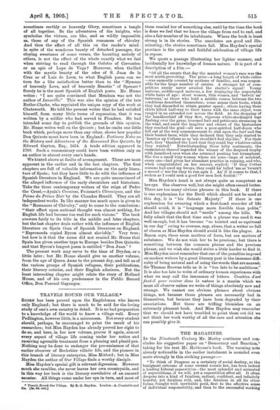TRAVELS ROUND OUR VILLAGE.*
SCORN has been poured upon the Englishman who knows only England; but there is much to be said for the loving study of one's own country in detail. It is no bad preparation to a knowledge of the world to know a village well. Every Pedlington, however little, is a microcosm. Not every student should, perhaps, be encouraged to print the result of his researches; but Miss Hayden has already proved her right to do so, and here, in her new volume, proves it again, almost every aspect of village life coming under her notice and receiving agreeable treatment from a pleasing and placid pen. Nothing may be done to endanger the pre-eminence of that earlier observer of Berkshire villatic life, and the pioneer in this branch of literary enterprise, Miss Mitford ; but in Miss Hayden the author of Our Village finds a worthy disciple.
Miss Hayden's special gift is relevant digression. However much she rambles, she never leaves her own countryside, and in this way her book is the literary correlative of an amused saunter. All things come under her eye in turn, and most of • Trawls Round Our Pillow). By R. O. Hayden. London : A. Constable and Co. Pa. Ill net.]
them remind her of something else, until by the time the book is done we feel that we know the village from end to end, and also a fair number of its inhabitants. Where the book is least strong is in its stories. The anecdotes are good and illu- minating ; the stories sometimes fail. Miss Hayden's special province is the quiet and faithful celebration of village life in repose.
We quote a passage illustrating her lighter manner, and incidentally her knowledge of human nature. It is part of a description of a fete :—
"Of all the events that day the married women's race was the most mirth-provoking. The prize—a long length of white calico —was earnestly coveted by mothers of families, and was respon- sible for the large number of entries. A stranger lot of com- petitors surely never awaited the starter's signal! Young matrons, middle-aged matrons, a few displaying the respectable white hairs of age: stout women, thin women, and • betwix' an' betweens,' as those who held a middle course between the two. conditionsdescribed themselves; some minus their boots, which they had discarded to attain greater speed ; others having their skirts kilted half-way to their knees with the same object, were ranged in an extended row across the field. At the dropping of the handkerchief off they flew, vigorous white-stockinged legs flashing over the grass, loosened hair and petticoats streaming in the wind, and amid the laughter and cheers of the bystanders they reached the goal—all save a poor-spirited half-dozen who fell out at the very commencement to sink upon the turf and fan their heated faces, while they declared that they only started to 'hearten up t'others so as 'um shouldn't feel shy-like.' For their part, they thanked the Lord that they could buy whaiiver calica they wanted.' Notwithstanding these lofty sentiments the enunciators thereof regarded the winner of the despised trophy with jaundiced eyes when she returned panting but triumphant. She was a small wiry woman whose six sons—imps of mischief, every one—had given her abundant practice in running, and who, when congratulated on her success, replied: 'If they Vother oomans had axed my bwoys, they could ha' tailed 'um as Iwurn't a mossel o' use fur they to run agin I. An' if it comes to that, I reckon as I could mek a good few men look foolish!"
Miss Hayden's hand is not always quite as competent as her eye. She observes well, but she might often record better. There are too many obvious phrases in this book. If there is one euphemism for the Devil which should not be used at this day, it is "his Satanic Majesty." If there is one euphemism for swearing which a first-hand recorder of life should avoid, it is "language more forcible than polite." And her villages should not "nestle" among the hills. We fully admit that the first time such a phrase was used it was well enough, but it has become "so tainted and so equivocal in our day" owing to overuse, nay, abuse, that a writer so full of charm as Miss Hayden should avoid it like the plague. As Bacon says, these seem matters of form, but are matters of substance. We do not wish her to be precious; but there is something between the common phrase and the 'precious phrase, and we wish she would strive a little harder to find it.
Miss Hayden must remember that one of the penalties imposed on modern writers by a great literary past is the immense diffi- culty of being natural and of using the words that are nearest. Sir Thomas Browne tells us it is "too late to be ambitious." It is also too late to write of ordinary human experiences with what we may call the innocence of letters. Combien d'art faut-il pour rentrer d,ans la nature is a maxim which we
must all observe unless we write of things absolutely new and strange. We cannot use obvious phrases about obvious things, not because those phrases are necessarily bad in themselves, but because they have been degraded by their associations. But these are trifling blemishes on an
extremely pleasant book. And Miss Hayden may remember that we should not have troubled to point them out did we not think her work worthy of all the care and attention she can possibly give it.










































 Previous page
Previous page